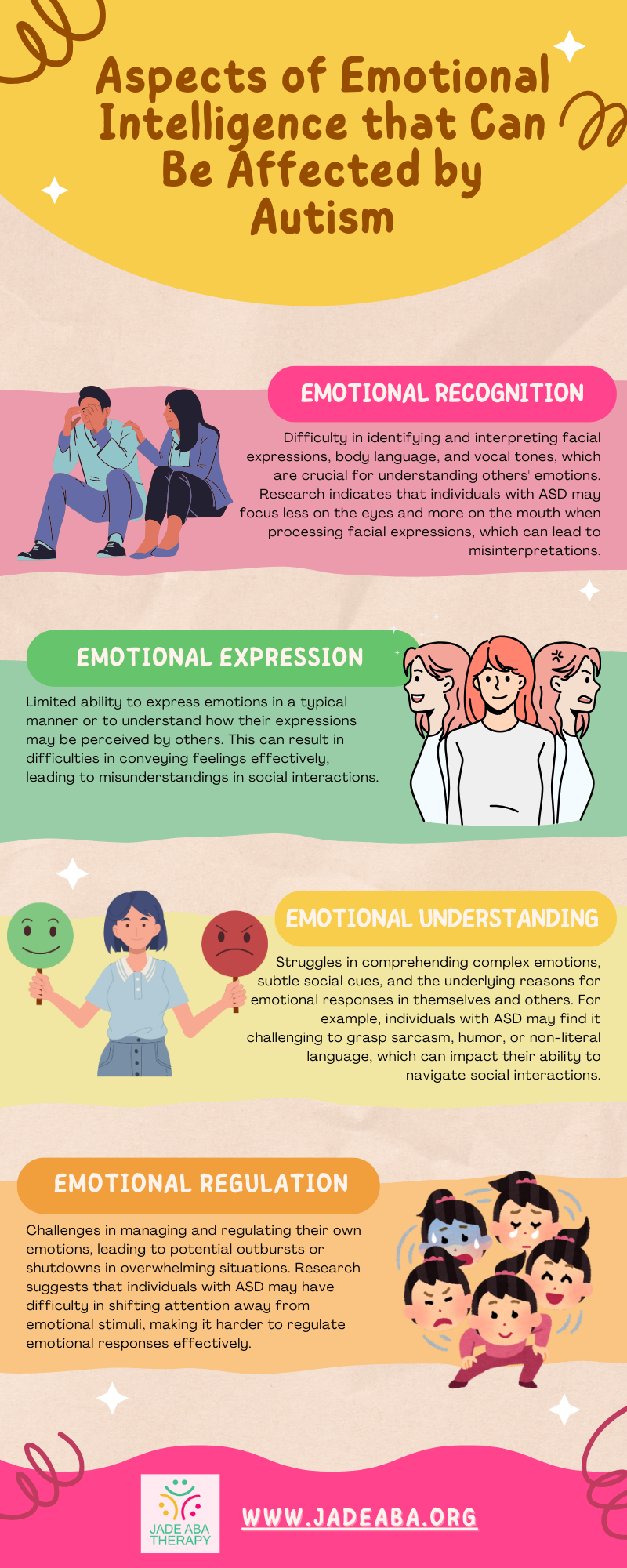One key aspect that’s less commonly discussed, but crucial to the experience of individuals with ASD, is emotional intelligence. Emotional intelligence refers to the ability to perceive, understand, manage, and express emotions effectively.
For people with autism, navigating emotional cues and interpersonal interactions can be particularly complex due to differences in neurocognitive processing.

What is Emotional Intelligence?
Emotional intelligence comprises several key components which are as follows:
- Emotional Awareness – The ability to recognize and understand one’s own emotions and the emotions of others. It involves being aware of subtle emotional changes, both within oneself and in others, which provides a foundation for effective social interactions and relationships.
- Emotional Expression – The capacity to effectively express emotions and respond appropriately to others’ emotional expressions. Individuals with high emotional intelligence can articulate their feelings clearly and adapt their expressions based on social context and norms.
- Emotional Understanding – The skill to comprehend complex emotional states and their causes. This includes not only recognizing basic emotions like happiness or sadness but also understanding mixed emotions, conflicting feelings, and the reasons behind emotional responses.
- Emotional Management – The capability to regulate one’s emotions and manage stress in various situations. This involves controlling impulses, adapting to changing circumstances, and coping with challenges without being overwhelmed by emotions.
These components collectively contribute to how individuals perceive, interpret, and interact with emotions, both their own and those of others.
Emotional Intelligence in Autism
Individuals with autism often experience challenges in emotional intelligence due to differences in social cognition and sensory processing. These challenges can affect various aspects of emotional intelligence such as:

Neurological Underpinnings of Emotional Intelligence in Autism
Research suggests that the neurological differences observed in autism, such as atypical connectivity in brain regions involved in social cognition (like the amygdala and prefrontal cortex), contribute to difficulties in emotional intelligence. The amygdala, known for its role in processing emotions and social information, may show altered activation patterns in individuals with ASD.
Similarly, the prefrontal cortex, responsible for decision-making and social behavior regulation, may exhibit differences that affect emotional regulation and understanding.
Functional magnetic resonance imaging (fMRI) studies have provided insights into these neurological underpinnings. For instance, altered patterns of brain activation in response to emotional stimuli in individuals with ASD compared to neurotypical individuals highlight differences in how emotional information is processed and integrated.

Studies and Findings
A study by Harms et al. (2010) investigated facial emotion recognition in children with ASD. They found that children with ASD had significant difficulties in identifying emotions from facial expressions compared to typically developing children. This difficulty is linked to challenges in processing and integrating visual information, which impacts their ability to discern subtle emotional cues.
Interventions focusing on improving facial emotion recognition skills through visual supports and explicit teaching strategies have shown promising results in enhancing emotional intelligence in individuals with ASD.
Research by Mazefsky et al. (2013) explored emotional regulation in adolescents with ASD. They observed that these individuals often use less effective strategies for managing their emotions, such as avoidance or repetitive behaviors, which may exacerbate social challenges and emotional dysregulation.
Interventions targeting emotion regulation skills, such as cognitive-behavioral techniques and mindfulness-based practices, have been effective in improving emotional self-regulation and reducing behavioral difficulties in individuals with ASD.
Lastly, a comprehensive review by Baron-Cohen highlighted impairments in social cognitive abilities, including emotional intelligence, as core features of autism. These impairments are not solely due to deficits in emotion recognition but also to difficulties in theory of mind – the ability to attribute mental states to oneself and others.
Understanding these foundational deficits is crucial for developing tailored interventions that address the specific needs of individuals with ASD in enhancing emotional intelligence and social skills.
Interventions and Support
Given the challenges individuals with autism face in emotional intelligence, targeted interventions are crucial such as:
- Social Skills Training – Programs designed to teach social cues, emotional expression, and perspective-taking can enhance emotional intelligence. Role-playing activities and peer interactions provide opportunities for practicing social skills in a structured environment.
- Emotion Regulation Techniques – Teaching specific strategies for recognizing and managing emotions can help individuals with ASD navigate social situations more effectively. Techniques such as deep breathing, visualization, and problem-solving can empower individuals to cope with emotional challenges and regulate their responses.
- Sensory Integration Therapy – Addressing sensory sensitivities that contribute to emotional dysregulation can improve overall emotional well-being. Occupational therapy techniques, including sensory diets and sensory-friendly environments, support individuals in managing sensory input and reducing stress levels.
- Cognitive Behavioral Therapy (CBT) – CBT techniques adapted for autism can aid in understanding and managing emotions and behaviors. Cognitive restructuring and behavior modification strategies help individuals develop adaptive coping mechanisms and build resilience in managing emotional triggers.
Understanding emotional intelligence in the context of autism requires recognition of the unique challenges individuals with ASD face in perceiving, expressing, and managing emotions. While these challenges stem from neurological differences, targeted interventions and support can significantly improve emotional intelligence and overall quality of life for individuals on the autism spectrum.
By fostering understanding and empathy, we can create more inclusive environments that support the emotional well-being of all individuals, regardless of neurodiversity.
While autism may present challenges in emotional intelligence, with understanding and appropriate interventions, individuals with ASD can develop skills to navigate emotional landscapes and build meaningful connections in their lives.
Continued research and advocacy are essential in advancing our understanding and support for individuals with autism, ensuring they have the tools and opportunities to thrive emotionally and socially.